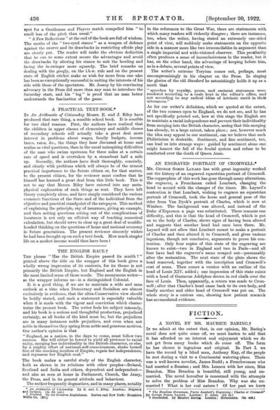_ME ENGLISH RACE.t Tsos phrase "Has the British Empire passed
its zenith ? " printed above the title on the wrapper of this book gives a wholly wrong impression of its contents, for its theme is not primarily the British Empire, but England and the English in the most limited sense of those words. The anonymous writer—.
so the wrapper informs us—is a distinguished Colonial.
It is a good thing, if we are to maintain a wide and sane outlook at a time when Democracy and Socialism are almost exclusively in evidence, that the ultra-Conservative view should be boldly stated, and such a statement is especially valuable when it is made with the vigour and conviction which charac- terize the present book. The writer feels his subject intensely, and his book is a serious and thoughtful production, prejudiced certainly, as all books of the kind must be, but the prejudices are in many instances noble prejudices, and even when not noble in themselves they spring from noble and generous motives.
Our author's opinion is that "England, as a nation, in the days to come, must follow two courses. She will either be forced to yield all pretence to racial unity, merging her individuality in the British character, or else, by a mighty effort of national,. self -consciouaneas, shake herself free of the mocking incubus of Empire, regain her independence, and repossess her English soul."
The book makes a careful study of the English character, both as shown in its relations with other peoples—Ireland, Scotland and India and others, dependent and independent— and also as seen at home in Parliament, Church, the Army, the Press, and in its general attitude and behaviour.
The author frequently dogmatizes, and in many places, notably • An Aritlatalie of Citizenship. By E. and .1. Riley. London; Sidgwick and Jackson. l2s. ed. net.) t England. By An Overseas Engliabcnsn Roston and New York: Houghton Mifflin Co, 1.$2.1 in the references to the Great War, there are statements with which many readers will violently disagree ; there are instances, too, when the writer, having stated an extremely one-sided point of view, will suddenly make statements on the opposite side in a manner more like two irreconcilables in argument than a single impartial and wide-visioned observer. This peculiarity often produces a sense of inconclusiveness in the reader, but it has, on the other hand, the advantage of keeping before him, as in a debate, several points of view.
The writer's extreme Toryism comes out, perhaps, most uncompromisingly in his chapter on the Press. In singing the glories of the old Standard he astonishingly holds it up as a merit that "speeches by royalty, peers, and eminent statesmen were rendered according to a scale kept in the editor's office, and not according to any radical ideas of intrinsic merit in their utterances."
As for our writer's definition, which we quoted at the outset, of the two courses open to England, we do not see, and he has not specifically pointed out, how at this stage the English are to maintain a racial independence and prevent their individuality from merging into the British character, seeing that this merging has already, to a large extent, taken place ; nor, however much the idea may appeal to our sentiment, can we believe that such Philistinism is desirable. Sentiment, and fine sentiment, too, can lead us into strange ways : guided by sentiment alone one might lament the fall of the feudal system and refuse to be comforted over the death of Queen Anne.


































 Previous page
Previous page